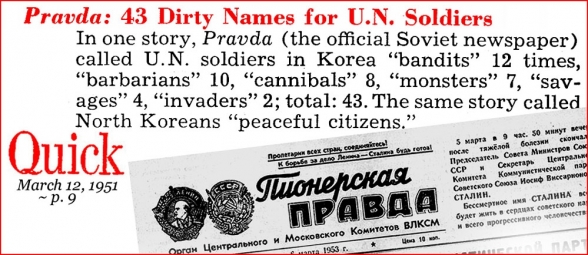The Cold War - The Korean War
 By the autumn of 1950 it became clear to the old hands at the Pentagon that the "police action" on the Korean peninsula was beginning to resemble a real war. With that in mind, thirteen military training camps that had been been barren for the past five years, were dusted off in order that they might once more begin training Americans for war. Two weeks later China threw her hat in the ring.
During this same period, the U.S. Navy took 62 ships that had been mothballed in order to launch the Inchon Landings...
On Friday, November 3, 1950 Mao Tse-Tung (1893 – 1976) ordered the Chinese Army to intervene in the Korean War on behalf of the the retreating North Korean Army:
"...perhaps [as many as] 250,000 Chinese Communists jumped into the battle for Northwest Korea; at best, their intervention meant a winter campaign in the mountains; at worst, a world war."
From Amazon: The Korean War: The Chinese Intervention
"The first surprise attack came at night. It was mounted by reckless fighters, who swarmed into battle on horseback and afoot after [American] bugles had morbidly sounded 'taps'. The Reds pounced on two combat regiments of the American First Cavalry Division and the South Korean First Division. Hundreds of civilians, caught by the flaming machine gun and mortar fire, were mowed down. In U.N. casualties, it was the one of the costliest engagements of the war." "Man, those Chinese are good soldiers... You can't see'em; you can't hear'em. You don't know they're there until they're on top of you... They're experts at camouflage and the best damn night-fighters I've ever seen. We could walk a company over the hill and see nothing. Then we'd look around and they'd be swarming on us like flies. It was just like they'd sprouted from the ground." As is made clear on this website, numerous tanks were fielded by the U.N. Forces during the Korean War, and one of the most effective ones was the Patton Tank (in all it's variations). This snippet appeared on the newsstands shortly after Halloween, 1950. It will give you a sense of the great relief that was felt not simply in the halls of Congress and the Pentagon, but all across the country. The journalist wrote this report as if decades had past and a distant memory was being recalled about a five month-long war that was once fought and won by the all-suffering Americans and their U.N. Allies, but the Communists learned their lesson, so we don't have to worry about them anymore. The war's turning point is hailed (The Inchon Landings), as is General MacArthur, American casualty figures are listed and mention is made of the South Koreans moving into the recently liberated towns of the North. But this same reporter would write a very different article for the next issue of the magazine when he would relay that the war had expanded, and casualty figures had ballooned with the intervention of the Chinese Army. |
MORE ARTICLES >>> PAGE: * 1 * 2 * 3 * 4 * 5 * 6 * 7 * 8 * 9 * 10 * 11 * > NEXT |
|